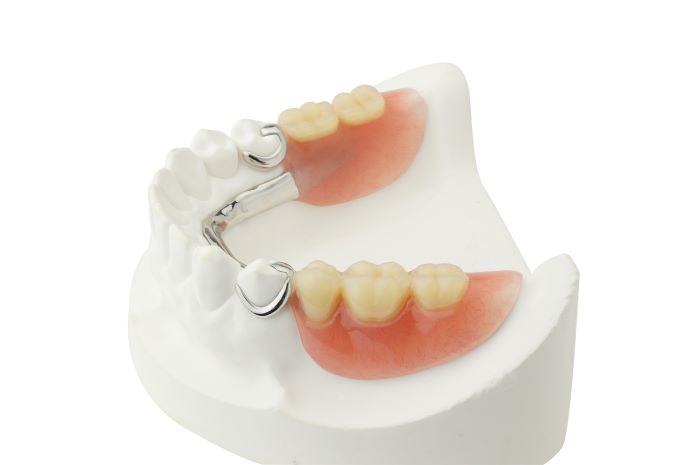All About Complete and Partial Dentures

A denture is a removable dental prosthesis used to replace lost teeth. They are replica teeth that look and feel like the real thing! Complete dentures and partial dentures are the two kinds of dentures available. A partial denture not only replaces lost teeth but also serves to stabilize the remaining teeth, making it the most well-known and widely used kind.
Dentures are available in two varieties: conventional and instant. After the teeth have been removed and the gum tissue has healed, a traditional denture is fabricated and fitted. Instant dentures are made ahead of time and inserted immediately after a tooth extraction to prevent the patient from going without teeth while healing from the operation. It is necessary to make adjustments to the implant after tissue shrinking and healing.
Dentures may need to be produced, fixed, or readjusted over time due to regular wear and tear. Willow Springs Dentistry is committed to providing comprehensive information on full, partial, and other dentures!
When to Get Dentures
When no teeth remain in the upper or lower jaw, it necessitates a denture. A Partial Denture is required if an upper or lower jaw lacks teeth. Dentures may improve your smile, facial appearance, and ability to eat, talk, and digest.
Process of Getting Dentures
Getting dentures requires many visits over several weeks. Your customized denture is manufactured from exact imprints (molds). It may take many "try-in" sessions to acquire the exact blend of curves, colors, and proportions. Final adjustments and denture implantation will provide a secure and comfortable fit. You might face increased salivation, discomfort, difficulty eating or speaking as your muscles and tissues adjust to the dentures. You'll get denture care instructions. Your new dentures will last longer if you keep up with regular dental visits.
Denture issues
No denture is flawless, so keep that in mind while getting yours made. When your denture is delivered, you may need some time to become accustomed to it. Remember that getting used to your new dentures may take some time. Getting acclimated to a new denture might be difficult since it affects your eating and speaking habits. Also, a lower denture may be more difficult to keep in the mouth than an upper one due to jaw shape alterations and tongue and cheek muscle activity.
Complete Dentures
Both conventional and immediate dentures exist in complete dentures! Full/complete dentures are made when all teeth are extracted, and the gingiva has healed. A conventional denture is ready to use eight to twelve weeks after tooth extraction. A complete denture is constructed before tooth extraction and placed in the mouth immediately. As a result, wearers do not lose teeth during therapy.
Partial Dentures
Partial dentures are an option for those who have lost one or more teeth. Partial dentures may be removed from the mouth or worn for a few hours at a time. The partial denture is then clasped or otherwise retained to the natural teeth. Partial dentures are made using a mouth mold. A partial denture takes 6-8 weeks to finish. However, this varies by individual. The dentist's or lab technician's approach and denture type may impact.
Partial Denture Care
Preparing your teeth for a partial denture is the first step. At this point, your dentist may start prepping the teeth for the partial denture. Next, your dentist will record your bite and take an impression of your upper and lower dental arches. The dental lab processes the impressions. Your dentist will check the partial denture teeth and gums for fit and function and your speech. When the final fit and aesthetics are achieved, the denture is returned to the lab for final fabrication.
Partial Denture Complications
Despite the dentists' best efforts, you and your partial denture may require some time to get acclimated. Remember that getting used to a partial denture takes time and patience. It may take some time to become used to a new partial denture and change your eating and speaking habits.
Immediate Dentures
Immediate dentures are made from a mold of your mouth. The dentist will take an impression of your upper and lower arches to construct a bite as near your original as possible. Your dentist can help you choose denture teeth and gums. This is sent to the dental lab. Next, the dentist will modify your bite, test your speech, and evaluate your dentures and gums to ensure they look and operate properly. This step may need to be repeated to ensure perfection.
Once the fit and appearance are perfected, the denture is shipped back to the lab for fabrication. Next, the denture will be fitted, and the remaining teeth will be extracted. The number and quality of teeth to be removed and your jaws and health may need many extraction sessions. Your dentist may advise you on when to get your wisdom teeth removed.
Immediate Denture Issues
A high-quality and practical denture is created, yet no denture is ever perfect. It may take some time for you and your immediate denture to become accustomed to one other. Because your gums will shrink following extractions, your denture will need to be re-based or re-lined every six months. Adapting to your immediate dentures may take weeks or months, depending on your adaptability.
An immediate denture will not allow you to chew food as effectively as real teeth. With an immediate denture, your speech may be impaired, and it may take some time to adjust. Lower dentures are more difficult to keep in the mouth than upper dentures due to the differing jaw shapes and intense tongue and cheek motions. For example, implants may now restore teeth to a degree of function similar to natural teeth. The dentist is the ideal person to ask.
Stasis/Temporary Denture
Your dentist may advise you to receive a temporary partial denture or a stayplate while your gums and supporting bone heal. A stayplate may let you eat and speak normally while a more permanent solution is discovered. A stayplate is required for public appearances and prevents teeth from shifting and causing problems.
Alternatives to Dentures
Dental implants are becoming more popular, but not everyone is a good candidate for them. If you have any concerns concerning dentures or implants, please do not hesitate to contact Willow Springs Dentistry.
Eating with New Dentures
Some people may have difficulty eating for a few days after obtaining new dentures. Eat soft meals chopped into little pieces to help you get acclimated to your new dentures. Taste each spoonful slowly and thoroughly with both lips. As you become used to your new dentures, experiment with various meals.
Our dentist at Willow Springs Dentistry, Dr. Marc McRae, can create a treatment plan tailored to your specific needs. Willow Springs Dentistry is also a leader in cosmetic dentistry, including gum reshaping and other procedures. So please get in touch with us as soon as possible if you believe we may be able to help you!



